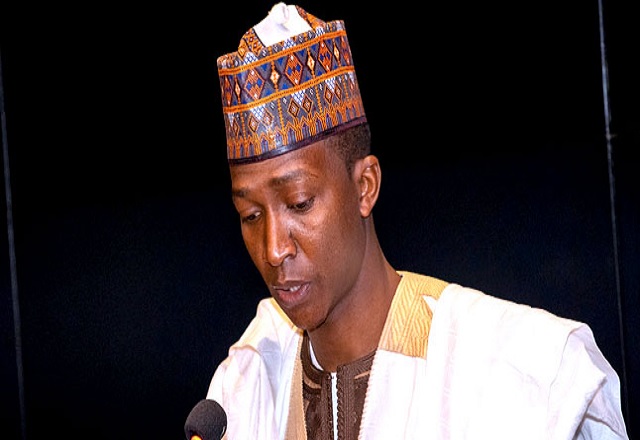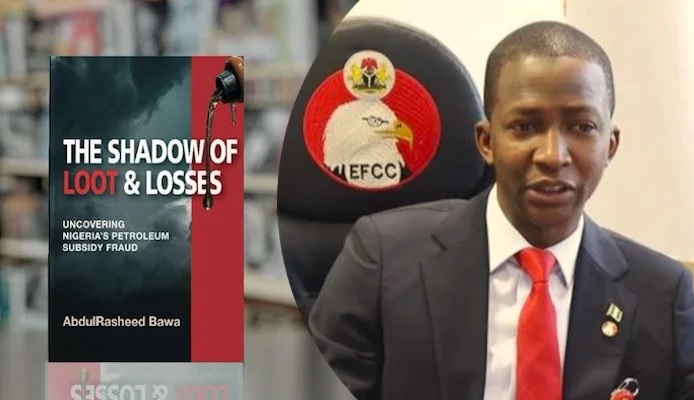In a groundbreaking revelation, former Chairman of the Economic and Financial Crimes Commission (EFCC), Abdulrasheed Bawa, has unveiled the intricate web of corruption that plagued Nigeria’s fuel subsidy regime. His new book, “The Shadow of Loot & Losses: Uncovering Nigeria’s Petroleum Subsidy Fraud,” offers an insider’s perspective on one of the nation’s most significant financial scandals.
According to a statement from the publishers, Abdulrasheed Bawa draws heavily on his direct involvement as a key investigator with the EFCC’s special task force that examined the 2012 fuel subsidy fraud.
The statement, shared with journalists on Tuesday and signed by Vic Akinrogunde, highlights how Bawa exposes the vast scale, complexity, and boldness of the schemes that drained public funds through fraudulent subsidy claims.
His insider account not only details the recovery of billions of naira and the prosecution of numerous offenders but also reveals how deep-rooted corruption allowed the scam to persist for many years.

Among the tactics employed by those behind the fuel subsidy scam were:
- Ghost importing and over-invoicing: Companies submitted subsidy claims for fuel shipments that never actually arrived or exaggerated quantities to receive inflated payments.
- Manipulating bills of lading: Fraudsters altered shipping documents to take advantage of fluctuations in international prices and boost their subsidy claims.
- Round-tripping and double claiming: Single fuel shipments were often claimed multiple times to receive repeated subsidy payments.
- Diversion and smuggling: Subsidized fuel was regularly diverted to black markets or smuggled outside Nigeria to generate illicit profits.
Bawa further explained that these fraudulent activities thrived due to forged documents, lax regulatory oversight, and widespread collusion between corrupt government officials and private sector players. He emphasized that the book serves not only as a record of corruption but also as a strong plea for transparency, accountability, and significant reforms in the management of Nigeria’s public finances, particularly in the petroleum sector.
Here is What The Book Talks About.
Published by CableBooks and distributed nationwide by Roving Heights Bookstore, Bawa’s book delves deep into the mechanisms of the fuel subsidy fraud. Drawing from his firsthand experience as a key investigator during the 2012 EFCC probe, Bawa exposes the staggering scale and audacity of the schemes that siphoned billions of naira from public coffers.
💰 Unveiling the Fraudulent Practices
Bawa identifies several key fraudulent strategies employed by perpetrators:
-
Ghost Importing and Over-Invoicing: Companies submitted claims for fuel that was never imported or inflated shipment volumes to receive excessive subsidy payouts.
-
Manipulation of Bills of Lading: Fraudsters altered shipping documents to exploit international price fluctuations, claiming higher subsidies.
-
Round-Tripping and Double Claims: Single shipments were used to obtain multiple subsidy payments.
-
Diversion and Smuggling: Subsidized fuel was diverted to black markets or smuggled out of Nigeria for profit.
These practices were enabled by forged documents, weak regulatory oversight, and systemic collusion between corrupt government officials and private sector actors.
🛢️ The Impact of the Subsidy Regime
The fuel subsidy, which was officially removed in May 2023 by President Bola Tinubu, had long been a contentious issue in Nigeria. While intended to alleviate the financial burden on citizens, the subsidy became a conduit for massive corruption. The revelations in Bawa’s book shed light on how this system was exploited, leading to significant financial losses for the country.
📖 A Call for Reform
Beyond exposing the fraud, Bawa’s book serves as a clarion call for transparency, accountability, and reform in Nigeria’s public finance management, especially in the oil sector. It emphasizes the need for robust regulatory frameworks and the importance of vigilance in safeguarding public resources.
Who Is Abdulrasheed Bawa?
Abdulrasheed Bawa served as the EFCC Chairman from 2021 to 2023. During his tenure, he spearheaded several high-profile investigations and reforms within the commission. His efforts led to the recovery of billions of naira and the prosecution of numerous individuals involved in financial crimes. Despite facing challenges, including his suspension in 2023, Bawa’s commitment to combating corruption remains evident in his latest work.
The Shadow of Loot & Losses is more than just a recounting of past misdeeds; it is a testament to the resilience of individuals committed to truth and justice. For readers interested in understanding the intricacies of Nigeria’s fuel subsidy fraud and the broader implications of systemic corruption, Bawa’s book is an essential read.

